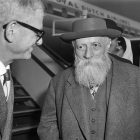Swimming in the Rain: New and Selected Poems 1980-2015
by Chana Bloch
Autumn House Press, 2015
A child of immigrant parents who was raised in an observant Jewish household, poet Chana Bloch has absorbed the details of her ethnic and linguistic heritage; this includes what she has called “the habit of questioning,” which is “not only sanctioned by Jewish tradition, it’s an honored part of it.” As a poet, biblical scholar, and translator of ancient and modern Hebrew poetry, she has followed her teacher Robert Lowell’s advice to “learn to write from [her] own translations.”
Swimming in the Rain: New and Selected Poems demonstrates that Bloch has converted that important lesson into a unique poetic voice that modulates from the homespun to the literary and shifts from wit and humor to a pull-no-punches toughness. Spare and musical, intimate while open to history, intelligent and emotionally rich in the details of divisions and connections, Bloch’s poetry negotiates the complexities of her identity as a first-generation Jew, a woman, a child, a parent, a wife, a lover, and a citizen. A self-proclaimed “Jewish humanist,” Bloch quarrels with tradition by asking why God has to make divisions. Some of the divisions she writes about include those between husband and wife, parents and children, illness and health, historical memory and momentary joy, and the contradictions within Judaism itself. Bloch critiques these divisions and, when she finds them, offers alternatives that are more inclusive and more humanistic.


